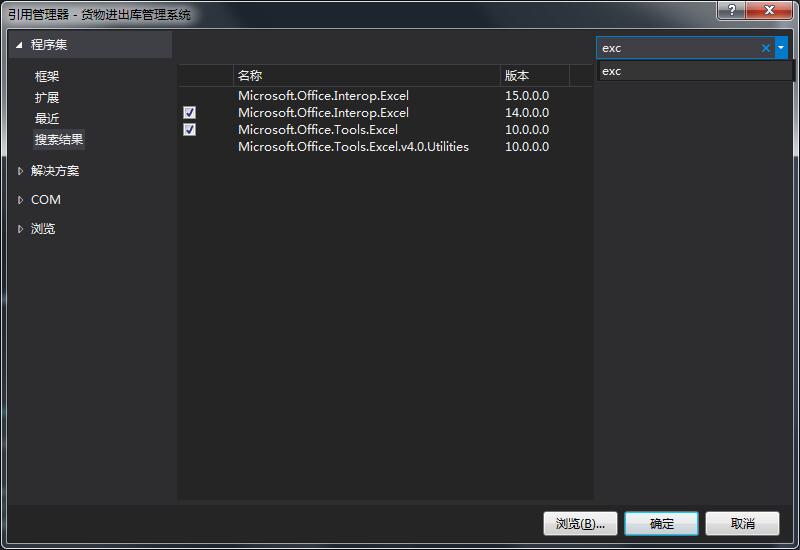c# Datagridview控件导入/导出excel表格
在写商业软件的时候,我们会经常遇到对excel表格的操控,最常见的就是Datagridview控件导入/导出excel表格。我也同样遇到了。运用了自己的知识,再加上网上的【大部分】都过期的源码,自己写出了这两个方法,当然,和绑定数据库一样,都用到了databel类。
导入:
//private string fileName;
/// <summary>
/// 将DataGridView中数据导入到Excel
/// </summary>
/// <param name="dgv">DataGridView的名称</param>
public System.Data.DataTable ImportExcel(string path)
{
DataSet ds = new DataSet();
string strConn = "";
if (Path.GetExtension(path) == ".xls")
{
strConn = string.Format("Provider=Microsoft.Jet.OLEDB.4.0;Data Source={0};Extended Properties=Excel 8.0;", path);
}
else
{
strConn = string.Format("Provider=Microsoft.ACE.OLEDB.12.0;Data Source={0};Extended Properties=Excel 8.0;", path);
}
using (var oledbConn = new OleDbConnection(strConn))
{
oledbConn.Open();
var sheetName = oledbConn.GetOleDbSchemaTable(OleDbSchemaGuid.Tables, new[] { null, null, null, "Table" });
var sheet = new string[sheetName.Rows.Count];
for (int i = 0, j = sheetName.Rows.Count; i < j; i++)
{
sheet[i] = sheetName.Rows[i]["TABLE_NAME"].ToString();
}
var adapter = new OleDbDataAdapter(string.Format("select * from [{0}]", sheet[0]), oledbConn);
adapter.Fill(ds);
}
return ds.Tables[0];
}
public void daoru(){
string filePath = "";
OpenFileDialog openFileDialog1 = new OpenFileDialog();
openFileDialog1.Filter = "excel文件|*.xls";
openFileDialog1.FilterIndex = 2;
openFileDialog1.RestoreDirectory = true;
if (openFileDialog1.ShowDialog() == DialogResult.OK)
{
filePath = openFileDialog1.FileName;
System.Data.DataTable dt = ImportExcel(filePath);
this.dataGridView1.DataSource = dt;
}
}
导出:
public static void ExportExcel(string fileName, DataGridView myDGV)
{
if (myDGV.Rows.Count > 0)
{
string saveFileName = "";
//bool fileSaved = false;
SaveFileDialog saveDialog = new SaveFileDialog();
saveDialog.DefaultExt = "xls";
saveDialog.Filter = "Excel文件|*.xls";
saveDialog.FileName = fileName;
saveDialog.ShowDialog();
saveFileName = saveDialog.FileName;
if (saveFileName.IndexOf(":") < 0) return; //被点了取消
Microsoft.Office.Interop.Excel.Application xlApp = new Microsoft.Office.Interop.Excel.Application();
if (xlApp == null)
{
MessageBox.Show("无法创建Excel对象,可能您的机子未安装Excel");
return;
}
Microsoft.Office.Interop.Excel.Workbooks workbooks = xlApp.Workbooks;
Microsoft.Office.Interop.Excel.Workbook workbook = workbooks.Add(Microsoft.Office.Interop.Excel.XlWBATemplate.xlWBATWorksheet);
Microsoft.Office.Interop.Excel.Worksheet worksheet = (Microsoft.Office.Interop.Excel.Worksheet)workbook.Worksheets[1];//取得sheet1
//写入标题
for (int i = 0; i < myDGV.ColumnCount; i++)
{
worksheet.Cells[1, i + 1] = myDGV.Columns[i].HeaderText;
}
//写入数值
for (int r = 0; r < myDGV.Rows.Count; r++)
{
for (int i = 0; i < myDGV.ColumnCount; i++)
{
worksheet.Cells[r + 2, i + 1] = myDGV.Rows[r].Cells[i].Value;
}
System.Windows.Forms.Application.DoEvents();
}
worksheet.Columns.EntireColumn.AutoFit();//列宽自适应
// if (Microsoft.Office.Interop.cmbxType.Text != "Notification")
// {
// Excel.Range rg = worksheet.get_Range(worksheet.Cells[2, 2], worksheet.Cells[ds.Tables[0].Rows.Count + 1, 2]);
// rg.NumberFormat = "00000000";
// }
if (saveFileName != "")
{
try
{
workbook.Saved = true;
workbook.SaveCopyAs(saveFileName);
//fileSaved = true;
}
catch (Exception ex)
{
//fileSaved = false;
MessageBox.Show("导出文件时出错,文件可能正被打开!\n" + ex.Message);
}
}
//else
//{
// fileSaved = false;
//}
xlApp.Quit();
GC.Collect();//强行销毁
// if (fileSaved && System.IO.File.Exists(saveFileName)) System.Diagnostics.Process.Start(saveFileName); //打开EXCEL
MessageBox.Show("导出文件成功", "提示", MessageBoxButtons.OK);
}
else
{
MessageBox.Show("报表为空,无表格需要导出", "提示", MessageBoxButtons.OK);
}
}在使用代码段之前不要忘记添加引用:
using System;
using System.Collections.Generic;
using System.ComponentModel;
using System.Data;
using System.Drawing;
using System.Linq;
using System.Text;
using System.Windows.Forms;
using System.Data.OleDb;
using System.IO;
using System.Linq;
using System.Diagnostics;
using Microsoft.Office.Interop.Excel;
(⊙o⊙)哦,对了,还不要忘记引用这个!



 浙公网安备 33010602011771号
浙公网安备 33010602011771号